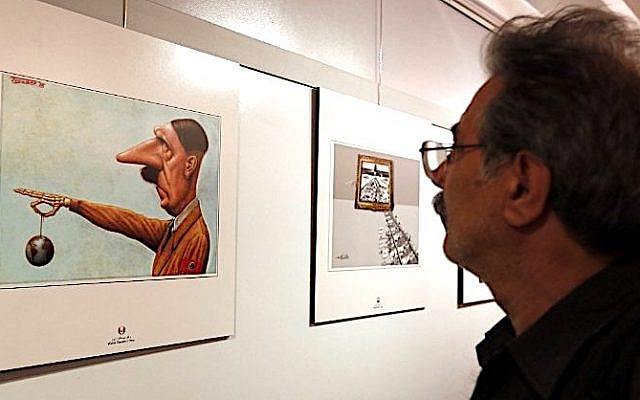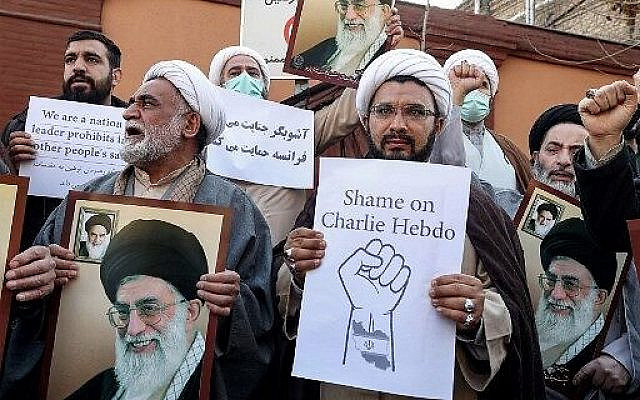
On January 20, 2022, the United Nations General Assembly passed a resolution that condemned the denial and distortion of the Holocaust. To no one’s surprise, the Islamic Republic of Iran chose to be the only country in the world that condemned and rejected this resolution.
The UN passed the resolution one month after Iranian President Ebrahim Raisi cast doubt on the Holocaust during an interview on CBS News’s 60 Minutes.
One year later, on the eve of International Holocaust Remembrance Day, the eyes of the world are on the sustained protests on the streets of Iran, and the global community must continue to hold the Iranian regime accountable for its systemic denial of the Holocaust and the disrespecting of its victims.
To date, on three occasions, the Iranian regime has held Holocaust cartoon competitions. The first one was held in 2006, soon after Mahmoud Ahmadinejad took the presidential office. For the second one held in 2016, Supreme Leader Ali Khamenei sent a personal message of praise to the organizers. On New Year’s Day in 2021, Iranian officials, acting with the support of Khamenei, released the full results of Iran’s third major collection of political cartoons aimed at promoting Holocaust denial.
Meanwhile, the Iranian regime continues to cynically use the Holocaust to attack the West. It does so by stating that claims of freedom of speech in Western countries are lies because Western governments disallow and punish Holocaust denial.
This was evident recently, soon after the French satirical magazine Charlie Hebdo published caricatures of Supreme Leader Khamenei.
In an article published on January 7, 2023, in the Iran-based Khabar Online, former Iranian diplomat Mohsen Pakaein used the ban against Holocaust denial in France to claim that what allowed the caricatures to be published was not free speech laws in France, but Islamophobia sanctioned by the French government. Describing the Holocaust as a “doubtful” event, Pakaein went on to state that the laws preventing investigations into the Holocaust had caused many European Christians to hate Zionists. He further claimed that these laws also made antisemitism an “inseparable part of Europe’s Christian culture,” ignoring the many centuries before the establishment of the modern state of Israel, during which antisemitism was part and parcel of Christian Europe.
Demonstrators hold images of Iran’s Supreme Leader Ayatollah Ali Khamenei during a protest against cartoons depicting him published by French satirical weekly Charlie Hebdo, outside the French embassy in Iran’s capital Tehran on January 8, 2023. (ATTA KENARE/AFP)
Pakaein was not alone. Soon after, other Iranians, including senior officials such as Assembly of Experts member Ayatollah Mohammad Khatami, used the same argument regarding the Holocaust to publicly attack Charlie Hebdo’s caricatures of Khamenei. Khatami, much like other hardliners, believes that the French government deliberately sanctioned their publication. Referring to Charlie Hebdo’s previous caricatures of Prophet Mohammad, Khatami attacked the French government: “This publication [Charlie Hebdo] is not important. What is important is the support of the government of France for this publication, done in the name of freedom of speech. A freedom of speech where no one can say anything about the Holocaust.”
In the coming years, there should be no realistic expectation that the Iranian regime will move away from its Holocaust rhetoric.
That is mainly because Iran’s most powerful figure, Supreme Leader Khamenei himself, has been doubting and denying the Holocaust for many years. In May 1990, he stated, “Maybe what happened [in the Holocaust] was much smaller than what has been described.” Then in February 2006, he publicly referred to the Holocaust as an “afsaneh,” a myth, in Persian. Khamenei has also publicly defended Holocaust deniers such as Roger Garaudy.
Iranian regime officials, who are far more powerful than elected officials, tread carefully within the limits set by Khamenei on any major topic. The Holocaust is one such topic. To deviate from Khamenei’s approach would at the very least mean losing special political and economic privileges. This would be a major loss for regime insiders, as Iran is under severe sanctions. Since the Iranian public’s resentment against the regime is at an all-time high, such officials would have little to turn to if they were to lose their privileges.
‘Of Jewish origin’
It is also very unlikely that Khamenei would change his views on the Holocaust. While his regime tolerates Iran’s Jews, it also maintains deeply antisemitic views. Numerous regime-sanctioned news sites have published articles stating that Jews (or “Zionists”) control the media as well as the governments and finances of various Western countries. Meanwhile, well-known antisemites such as French Holocaust denier Dieudonné M’bala M’bala and Nation of Islam leader Louis Farrakhan have been welcomed as guests of the Iranian regime in 2015 and 2018, respectively.
Regime supporters also use the term “of Jewish origin” (al Yahud) as a form of slander to attack their rivals and enemies abroad. On numerous occasions, including in public ceremonies, regime-sanctioned preachers and officials have referred to the al Saud family of Saudi Arabia as “al Yahud.”
There has also been a rise in the number of Khamenei-affiliated officials attacking Jews in their public speeches. For example, in his sermon in late April 2022, Ayatollah Tabatabainejad, who is the Khamenei-appointed Friday prayer leader of the city of Isfahan, called Jews “the stupidest people on earth.” He then added that the majority of Jews are “kafar” (non-believers) and that Jesus Christ and King David had cursed them.
Then, in early January 2023, Hujjatolislam Ali Fazel Heydaji, who is the Khamenei-appointed temporary Friday prayer leader of the city of Tabriz, declared publicly that “Jews are greedy for worldly possessions. The enmity of Jews against others is over [their desired possession of] the world, not over faith.”
As the world grapples with Iran’s crackdown on protesters, the progress of its controversial nuclear program, and its malign regional and global actions, the continuation of the Iranian regime’s blatant Holocaust denial, and its fondness for public antisemitic statements, is something the international community must take seriously in dealing with Tehran.

No comments:
Post a Comment